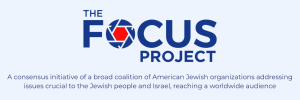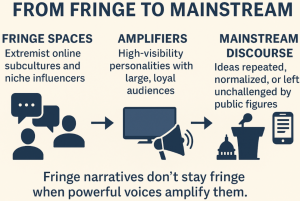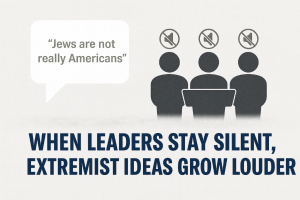
November 18, 2025
BACKGROUND – TALKING POINTS – ACTIONS TO CONSIDER – STORIES MAKING NEWS
![]()

Overt hatred of Jews is now being mainstreamed from both the left and the right. A dangerous spike in right-wing antisemitism – once confined to fringe corners of the internet – has now entered mainstream conservative dialogue. Prominent leaders in media, politics and public policy now promote narratives that question Judaism as a religion, portray Jews as outside the mainstream and often delegitimize Israel. In many cases, voices of key elected officials have failed to confront or correct these messages – allowing toxic narratives and blood libels to proliferate.
“An old poison spreads through the new right. What once lurked on the margins now claims the center.” – William Daroff, CEO, Conference of Presidents of Major American Jewish Organizations, Nov. 10, 2025

Rhetoric on the Right: Emerging Themes in Conservative Media and Politics
Tucker Carlson, an influential conservative media firebrand, has raised devious theological and historical claims about Jews and Judaism – casting Jewish identity as foreign or incompatible with American values and mirroring themes commonly associated with white Christian nationalist ideology. These arguments frequently overlap with those of commentator Nick Fuentes, an openly extremist, anti-Israel figure who frames America as fundamentally Christian and portrays Jews as outside of that national identity.
Carlson’s recent interview with Fuentes prompted criticism from conservative leaders including Senator Ted Cruz and conservative influencer Ben Shapiro who questioned the decision to offer Fuentes a platform. President Trump commented briefly on the Carlson-Fuentes controversy, defending Carlson, saying the former Fox News host has “said good things about me over the years,” but leaving judgment up to the people about the Carlson interview. President Trump has made it clear he is “not gonna condemn Nazis and he’s not going to condemn those who platform them,” CNN host Jake Tapper said.
Vice President JD Vance’s recent remarks at a Turning Point USA event drew criticism from an influential Christian Zionist leader Laurie Cardoza-Moore who argued that he allowed audience questions containing what she viewed as antisemitic undertones to go unaddressed. Cardoza-Moore recently stepped down from her role at the Heritage Foundation following disagreements over the organization’s continued association with Carlson.
Some conservative leaders have publicly pushed back. Senator Ted Cruz, for example, criticized fellow Republicans for not speaking out more forcefully, and internal dissent at the Heritage Foundation – including staff objections and resignations – has intensified discussion within the organization.
“If you sit there with someone who says Adolf Hitler was very, very cool, and that their mission is to combat and defeat global Jewry, and you say nothing, then you are a coward and you are complicit in that evil.” – Sen. Ted Cruz, Republican Jewish Coalition convention, Oct. 30, 2025

Antisemitism on the Left: Delegitimization Framed as Political Critique
Left-wing antisemitism often focuses on political delegitimization, treating Jewish identity and Israel as indistinguishable and framing Zionism as inherently oppressive. This trend dramatically accelerated after the Oct. 7 Hamas massacre. This allows hostility toward Jewish self-determination to be presented as political critique, even when the language echoes longstanding antisemitic narratives. It also tends to single out Israel for disproportionate scrutiny, implying collective responsibility on the part of Jews worldwide. These dynamics are visible in actions by figures such as U.S. Rep. Rashida Tlaib who recently introduced a resolution that would recognize the false claim of the genocide in Gaza.
Reactions to the recent NYC mayoral election of Zohran Mamdani’s have exposed deep fault lines within Jewish communities, with many leaders expressing concern that his longstanding support for the Boycott, Divestment and Sanctions movement and sharply critical stance toward Israel could further normalize more aggressive anti-Israel and anti-Jewish rhetoric in mainstream politics.
Recent attacks on PA Gov. Josh Shapiro have focused not on his qualifications or record, but on his Jewish identity – framing his faith as a disqualifying trait for public leadership. He has been labeled a “hardcore Zionist” because of his pro-Israel views. A Jewish Community Relations Council leader in MN said “when a Jewish elected official holds those same mainstream pro-Zionist positions as non-Jewish candidates he becomes for the left the wrong kind of Jew who must be ostracized from the party and disqualified from holding national office.”
This form of political delegitimization stands in sharp contrast to the growing diplomatic openness emerging across parts of the Middle East, including the recent expansion of the Abraham Accords with Kazakhstan and renewed dialogue with Syria and potentially even Saudi Arabia. These developments highlight that while some political actors harden anti-Israel rhetoric, a broader regional trend seems to be moving toward engagement, normalization, and cooperation with the Jewish state.

![]()

![]()

Silence is permission – and almost encouragement. Use your voice, your influence, your connections and your community to speak up and counter misleading or harmful rhetoric that harms Jewish inclusion and identity.
![]()

This year marks the 50th anniversary of the United Nations resolution declaring Zionism. Though ultimately repealed in 1991, the resolution left a lasting imprint by giving institutional backing to narratives that delegitimized Jewish self-determination and framed Israel’s very existence as suspect. Its legacy serves as a reminder that antisemitic ideas become mainstream when institutions and leaders fail to condemn them.
Stories Impacting American Jews
Stories Impacting the U.S. and Israel
Stories from Around the World
Stay Informed | Speak Up | Take Action
Want to Read More of Our Talking Points? Did you miss a recent edition of The Focus Project? No need to search your inbox. Our most recently published editions are available on our website.
![]()

This content is developed by The Focus Project in partnership with MERCAZ USA. The Focus Project distributes weekly news and talking points on timely issues concerning Israel and the Jewish people, including antisemitism, anti-Zionism and the delegitimization of Israel. It represents a consensus view across a spectrum of major American Jewish organizations. MERCAZ USA recognizes and respects the diversity of views on these issues among its readers and the community at large.